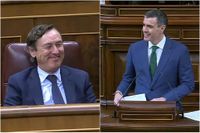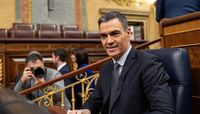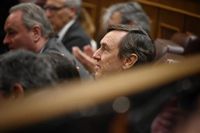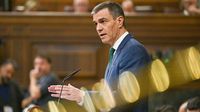On March 26, 2025, Spanish Prime Minister Pedro Sánchez found himself at the center of a heated exchange during a parliamentary session in the Congress of Deputies. The tension arose when Rafael Hernando, a member of the opposition Partido Popular (PP), shouted a question regarding Sánchez's partner, Begoña Gómez, who is currently under investigation for alleged influence peddling.
As Sánchez attempted to address the assembly regarding defense spending, Hernando interrupted, demanding to know, "How is your wife?" The Prime Minister, maintaining his composure, responded with a touch of sarcasm, "My wife is doing very well, how is yours?" This quip not only lightened the atmosphere but also drew attention away from the serious allegations surrounding Gómez.
Begoña Gómez is embroiled in a legal investigation led by the Court of Instruction number 41 in Madrid, following a complaint from the union Manos Limpias. She faces accusations of influence peddling, business corruption, misappropriation, and professional intrusion. The allegations suggest that she used her position as the Prime Minister's spouse to endorse businesses in public tenders, a claim her representatives have categorically denied.
During her previous appearances in court, Gómez asserted that she was not hired by the Instituto de Empresa (IE) due to her relationship with Sánchez, emphasizing that the first meetings with the institution occurred in 2017, well before Sánchez assumed office. "In no case, ever, because back in 2017, the Prime Minister was Mariano Rajoy," Gómez stated, attempting to distance herself from the accusations.
Despite the ongoing investigation, Sánchez's exchange with Hernando showcased his ability to navigate politically charged situations with humor. Hernando, known for his aggressive demeanor, posed his question without prior notice, perhaps hoping to catch Sánchez off guard. However, the Prime Minister's quick wit turned the tables, leading to a moment of levity amidst serious discussions about national defense.
As the debate on defense spending unfolded, Sánchez reiterated that increasing military funding would not detract from social programs, a point that has been a subject of contention among political factions. He highlighted the European Council's recent invitation to member states to raise defense spending to 2% of GDP, a move aimed at bolstering security in light of ongoing geopolitical tensions.
During the same session, Sánchez defended Spain's continuous support for Ukraine and endorsed a significant loan of 35 billion euros to assist the country amidst its ongoing conflict. This financial aid is part of a broader commitment to ensure stability and security within the European Union, reflecting Sánchez's strategic priorities as he navigates both domestic and international pressures.
The incident with Hernando not only underscored the personal stakes involved in political discourse but also highlighted the intricate relationship between personal lives and public responsibilities. While Gómez's legal troubles loom large, the Prime Minister's ability to deflect attention with humor may serve to maintain his political standing, at least in the short term.
As the investigation continues, it remains to be seen how these developments will impact Sánchez's government and his relationship with the opposition. The political landscape in Spain is often marked by fierce rivalries, and this latest episode is likely to fuel further debate and scrutiny surrounding the Prime Minister's administration.
In the wake of Hernando's interruption, the session resumed with Sánchez addressing the pressing issues of defense and security, a reminder that while personal matters can intrude into the political arena, the responsibilities of governance remain paramount. As Spain grapples with both internal and external challenges, the balance between personal and political will continue to be tested.
In summary, the exchange between Sánchez and Hernando serves as a microcosm of the current political climate in Spain, where personal lives intersect with public duties, and where humor can sometimes provide a necessary respite from the weight of serious allegations and pressing national issues.








